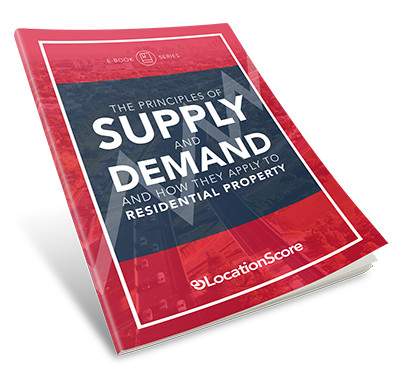×

The Principles of Supply and Demand and How They Apply to Residential Property
We Only Send You Awesome Stuff

LocationScore
|
June 8, 2017
Bryce: Okay, so the location school lads are here talking about online search interest. This is a really interesting measure because it doesn't seem that long ago where people would flip through the newspaper and have a look; but now—although print is still a part of people's search activity—the majority of people are looking online. Therefore, this indicator becomes more and more important over time.
Jeremy: Yeah, so what it is exactly is … You jump on realestate.com.au data, you look for four bedroom houses in Lidcombe and half a dozen pop-up or however many. You click on one: that click is recorded by realestate.com.au as a search. So there's someone searching for a Property. Now how many people have you got searching for that one property? If you record—if you keep track of all of these clicks, all these page visits—you can get a ratio of the number of people searching per property. And that's what online search interest is.
Ben: We know that on those search engine portals, both domain and realestate.com.au, they absolutely allow you to actually see the level of interest in that area. Now, what we're doing though, is looking at effectively 15,000 suburbs by units and by houses and we're aggregating that data. So, yes, you can find that data very easily can’t you? But then it's about, ‘How does that look?’ and, ‘How did that fit into the overall variables we look at?’
Bryce: Well, that’s the fundamental problem isn’t it? People could do it in isolation for one, two, maybe half a dozen suburbs; but it's being able to compare it in the context of the entire country, which makes the real edge.
Jeremy: Yeah. There are some issues with it though, it's not perfect.
Ben: No.
Jeremy: You don't know whether that person is the —
All the boys: The owner!
Jeremy: Yeah, the owner or a sticky beak or they keep coming back every week.
Bryce: We've all had a look at Potts Point and … well, we're not actually actively in the market!
Jeremy: That's right, yeah. So it can be a little unreliable—that's why it can vary from week to week, month to month. It's not something you can keep going back to visit over time. You need to look at a historical chart to see the line of best fit … where it is roughly. I mean, last week it might have been at 100, and this week it's a 20; but overall it's been sitting on 50 for the last six months. So you want to iron out all those kinks.
Bryce: What about seasonal trends in that data? Because, you know, in the beginning of the year you've got people who have New Year’s resolutions and they’re “dream building”; and in July they’ve got financial bonuses. Have you seen any trends?
Jeremy: Yeah, lifestyle locations: Noosa, Byron Bay, Coolangatta, around the summer holidays—
Ben: The warmer months.
Jeremy: Yeah.
Bryce: How do you effectively filter out some of those anomalies, or is that just as the line of best fit?
Jeremy: Yeah, the line of everything … you want to have a look over the last three years, or even over just one year, because then you can see the seasonal changes.
Ben: Yeah, I agree. I mean, it's really important to understand that this is not the one you would go out and bank on capital growth. Of all of the variables we're looking at; this indicator (online search interest) is almost like, “Alright, check, check, check, check, check; all looking good. Okay, and that one's not too bad either.” In other words: the weighting that we put into the score is not as significant as what Stock on Market (SOM) would be or Yield in terms of that suburb.
Jeremy: Yeah. And every indicator, every metric, suffers at some point or another. That's why it's so important to look at a broad range of them, not just one in isolation.
Ben: Yeah, yeah. And that's why we do a score of all that in terms of getting that weighting together.
Bryce: And that's the real science behind it. It’s being able to get the weighting right so that people can put the right amount of emphasis on the right indicator. So they can make a better decision AND collaborate that across the entire market.
Ben: At the end of the day, it's all about supply and demand. That's basically what we're trying to do. We're saying, “Where do we see an opportunity in the global market of Australia?” And then isolating those pockets, then seeing those trends in those areas and effectively validating that there is interest in the market. The worst thing to do for capital growth is to buy in a market where there's no interest, because you're going to be sitting there and the opportunity cost isn’t there Jeremy?
Jeremy: Yeah. I mean, you look at the opportunity cost the average Brisbane investor endured from, say 2012 to the end of 2016, versus buying in Sydney, a $500,000 property … you're looking at about a quarter of a million dollars in opportunity costs
Ben: At the moment. Which is incredible isn't it? I mean, that's the message here. Ultimately, there are still other variables that we measure as part of the DSR engine; but that's really important. For LocationScore, we're just making it easier for people to look at those simple measures, validate their areas, and move forward with their research.
Bryce: Ben, it's the LocationScore advantage … you've got the opportunity to find the suburb that's investment grade. You’re using the years of experience from the DSR data engine that Jeremy has poured is his life's work into—he calls himself a data a nut job. It's a fair indication that bringing together all of that data across all of these markets is helping people be able to sort of filter that down to an area that they're investing in, straight away. It can't be done on a manual basis.
Ben: It's the subject matter expertise that brings that together. So it's all well and good to look at lots of data, but it's about reading those insights. Jeremy is one of the best in Australia at determining those insights, and tweaking and weighting those variables to get the best result.
Bryce: So there you go folks! If you want the LocationScore advantage and get the years of experience that we've got from Jeremy, and the passion that comes from Ben and I, why don't you check it out and see if it helps you buy your next investment property in the best investment framework.
Note: This is just a brief explanation on Online Search Interest. If you are interested to learn how you can apply this in your own research, our upcoming webinar will unpack this in more details. Learn more about our webinar here.
Most Popular Blog Posts